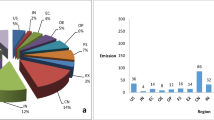Abstract
Case study and model results lend some optimism for the potential of small coalitions with partially excludable public goods to substantially deepen international cooperation on energy and climate issues. Drawing motivation from other issue areas in international relations ranging from nuclear non-proliferation, transboundary air pollution and liberalized trade, we use an evolutionary-game-theoretic model to analyze regimes that yield domestic incentives to contribute to public goods provision (co-benefits). Co-benefits may be limited, but can create a nucleus for formation of coalitions that grow while deepening provision of global public goods. The Climate and Clean Air Coalition (CCAC) is a prime example of an agreement that employs partially excludable club benefits to deepen cooperation on non-CO2 greenhouse gases. Our game-theoretic results support two important insights for the building blocks approach to addressing climate change: sustained cooperation in club agreements is possible even when public goods are not entirely excludable and some members of the population free-ride; and second, cooperation in small club configurations yields larger non-excludable public goods benefits than cooperation in more inclusive forums. This paper lends positive support that a proliferation of small agreements under a building blocks approach at the UNFCCC may be more effective (not just more likely) for deepening climate change cooperation than a fully inclusive approach.


Similar content being viewed by others
References
Aichele R, Felbermayr G (2012) Kyoto and the carbon footprint of nations. J Environ Econ Manag 63(3):336–354
Anthony I, Ahlstrom C, Fedchenko V (2007) Reforming nuclear export controls: the future of the nuclear suppliers group. Stockholm International Peace Research Institute. SIPRI Research Report No. 22
Axelrod R (1984) The evolution of cooperation. Basic Books, New York
Axelrod R, Hamilton WD (1981) The evolution of cooperation. Science 211(4489):1390–1396
Barrett S (2004) Environment and statecraft: the strategy of environmental treaty-making. Oxford University Press, USA
Buchanan JM (1965) An economic theory of clubs. Economica 32(125):1–14
Cole DH (2011) From global to polycentric climate governance. Climate Law 2(3):395–413
Downs GW, Rocke DM, Barsoom PN (1998) Managing the evolution of multilateralism. Int Organ 52(2):397–419
Drezner DW (2008) All politics is global. Princeton University Press, Princeton
Du Bois WEB (2007) The suppression of the African slave-trade to the United States of America, 1638–1870. Oxford University Press, Oxford
Dubash NK, Raghunandan D, Sant G, Sreenivas A (2013) Indian climate change policy. Econ Polit Wkly 48. Available at: http://www.epw.in/system/files/pdf/2013_48/22/Indian_Climate_Change_Policy.pdf
Fogel RW (ed) (1989) Without consent or contract: the rise and fall of American slavery. WW Norton & Company Inc, New York
Frankel J (2007) Formulas for quantitative emission targets. In: Aldy JE, Stavins RN (eds) Architectures for agreement: addressing global climate change in the post-Kyoto world. Cambridge University Press, New York
Hardin R (1982) Collective action. Resources for the future, Baltimore
Helleiner E, Pagliari S (2011) The end of an era in international financial regulation? A postcrisis research agenda. Int Organ 65(1):169–200
Kahler M (1992) Multilateralism with small and large numbers. Int Organ 46(3):681–708
Kapstein EB (1989) Resolving the regulator’s dilemma: international coordination of banking regulations. Int Organ 43(02):323–347
Keck ME, Sikkink K (1998) Activists beyond borders: advocacy networks in international politics, vol 35. Cornell University Press, Ithaca, NY
Keohane RO (1984) After hegemony: cooperation and discord in the world political economy. Princeton University Press, Princeton
Keohane RO, Victor DG (2011) The regime complex for climate change. Perspect Polit 9(01):7–23
Morris S, Shin HS (2002) Social value of public information. Am Econ Rev 92(5):1521–1534
Norwood B (1969) The Kennedy round: a try at linear trade negotiations. J Law Econ 12(2):297–319
Oatley T, Nabors R (1998) Redistributive cooperation: market failure, wealth transfers, and the Basle Accord. Int Organ 52(1):35–54
Olson M (1965) The logic of collective action: public goods and the theory of groups. Harvard University Press, Cambridge
Ostrom E (2010) Polycentric systems for coping with collective action and global environmental change. Glob Environ Chang 20(4):550–557
Ostrom E (2012) Nested externalities and polycentric institutions: must we wait for global solutions to climate change before taking actions at other scales? Economic Theory 49(2):353–369
Pacheco JM, Santos FC, Souza MO, Skyrms B (2009) Evolutionary dynamics of collective action in N-person stag hunt dilemmas. Proc R Soc Lond B276:315–321
Prakash A, Potoski M (2007) Collective action through voluntary environmental programs: a club theory perspective. Policy Stud J 35(4):773–792
Rayner S (2010) How to eat an elephant: a bottom-up approach to climate policy. Clim Pol 10(6):615–621
Rehm JB (1968) Developments in the law and institutions of international economic relations: the Kennedy Round of trade negotiations. Am J Int Law 62:403–434
Santos FC, Pacheco JM (2011) Risk of collective failure provides an escape from the tragedy of the commons. Proc Natl Acad Sci 108(26):10421–10425
Schelling TC (1978) Micromotives and macrobehavior. Norton, New York
Shindell D, Kuylenstierna JC, Vignati E, van Dingenen R, Amann M et al (2012) Simultaneously mitigating near-term climate change and improving human health and food security. Science 335(6065):183–189
Skjærseth JB (2008) The making and implementation of North Sea commitments: the politics of environmental participation. In Victor DG, Raustiala K, Skolnikoff EB (Eds). (1998). The implementation and effectiveness of international environmental commitments: theory and practice. MIT Press
Skjærseth JB, Stokke OS, Wettestad J (2006) Soft law, hard law, and effective implementation of international environmental norms. Glob Environ Polit 6(3):104–120
Snidal D (1985) The limits of hegemonic stability theory. Int Organ 39(04):579–614
Stewart RB, Oppenheimer M, Rudyk B (2013) A new strategy for global climate protection. Clim Chang 120(1–2):1–12
Strulak T (1993) The nuclear suppliers group. Nonproliferation Review 1(1):2–10
Traulsen A, Nowak MA, Pacheco JM (2007) Stochastic payoff evaluation increases the temperature of selection. J Theor Biol 244(2):349–356
U.S. Conference of Mayors (2009) 1000th Mayor – Mesa, AZ mayor Scott Smith signs the U.S. conference of mayors climate protection agreement [Press release]. Retrieved from http://www.usmayors.org/pressreleases/uploads/1000signatory.pdf
U.S. House of Representatives (2004). Should China join the nuclear suppliers group? Hearing before the committee on international relations. 108th Congress 2.
Vasconcelos VV, Santos FC, Pacheco JM (2013) A bottom-up institutional approach to cooperative governance of risky commons. Nat Clim Chang 3(9):797–801
Vasconcelos VV, Santos FC, Pacheco JM, Levin SA (2014) Climate policies under wealth inequality. Proc Natl Acad Sci 111(6):2212–2216
Victor DG (2006) Toward effective international cooperation on climate change: numbers, interests and institutions. Glob Environ Polit 6(3):90–103
Weber RA (2006) Managing growth to achieve efficient coordination in large groups. Am Econ Rev 96(1):114–126
Winham GR (1986) International trade and the Tokyo Round negotiation. Princeton University Press, Princeton
Acknowledgements
The authors thank seminar participants at Columbia University, Princeton University, and Fondazione Eni Enrico Mattei for valuable comments. Bob Keohane, Michael Oppenheimer, Rob Socolow, Joanne Scott, and Christina Davis provided insightful feedback. P.M.H. and S.A.L. benefited from the support of the Global Collaborative Networks Fund at Princeton University. V.V.V. and J.M.P. are grateful to the Department of Ecology and Evolutionary Biology at Princeton for the support during their visitation. This research was supported by the Walbridge Fund in the Princeton Environment Institute at Princeton University, by an FQEB grant (FQEB #RFP-12-14) from the John Templeton Foundation and NSF support through grants EF-1137894 and GEO-1211972, by FCT-Portugal through grants SFRH/BD/86465/2012, PTDC/MAT/122897/2010, and by Portuguese funds (PIDDAC) - PEst-OE/BIA/UI4050/2014, and Fundação Calouste Gulbenkian through the “Stimulus to Research” program for young researchers.
Conflict of interest
The authors declare no conflict of interest.
Author attribution
P.M.H. and J.M.P. designed the project; P.M.H. conducted the case study analysis; J.M.P., V.V.V., P.M.H., and S.A.L. designed and analyzed the model; P.M.H. and V.V.V. wrote the paper; All authors contributed intellectual content and commented on the manuscript.
Author information
Authors and Affiliations
Corresponding author
Additional information
This article is part of a Special Issue on “Alternate Structures for Global Climate Action: Building Blocks Revisited” edited by Richard B. Stewart and Bryce Rudyk.
Rights and permissions
About this article
Cite this article
Hannam, P.M., Vasconcelos, V.V., Levin, S.A. et al. Incomplete cooperation and co-benefits: deepening climate cooperation with a proliferation of small agreements. Climatic Change 144, 65–79 (2017). https://doi.org/10.1007/s10584-015-1511-2
Received:
Accepted:
Published:
Issue Date:
DOI: https://doi.org/10.1007/s10584-015-1511-2




